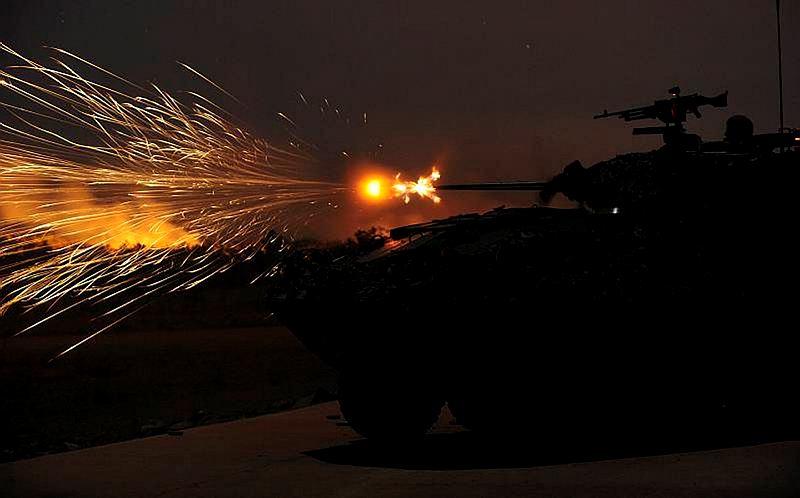Army and armour—moving the debate forward
Posted By Michael Clifford on March 2, 2015 @ 12:30
 [1]In a recent blog post [2] my colleague Karl Claxton took the opportunity to frame the issues around the Defence Minister Kevin Andrew’s recent Land 400 announcement [3]. Sadly, Karl echoes an old complaint:
[1]In a recent blog post [2] my colleague Karl Claxton took the opportunity to frame the issues around the Defence Minister Kevin Andrew’s recent Land 400 announcement [3]. Sadly, Karl echoes an old complaint:
Most commentators have been hostile toward the project from its inception [4] a decade ago. The key complaint arises from a disconnect [5] between strategic guidance in the 2000, 2009 and 2013 white papers, directing that equipment acquisitions be prioritised around what’s needed to prevent attacks against Australia and contribute to stability in our immediate region, and LAND 400’s focus on platforms for high-intensity contemporary and future operations including amphibious assault.
Armour and the Australian Army must be one of the most uninformed policy and capability debates in recent Australian defence history, and let’s face it, we have had some absolute classic defence force structure debates over the decades. In this case I want to put down some facts which may help us navigate our way through what’ll inevitably be an emotional rollercoaster for enthusiasts from both sides of the argument.
Let me state up front: the heavy/light and high-intensity/low-intensity debate is complete rot! Disconnected from strategic guidance? Again rot! I for one am more concerned with saving lives and giving the government of the day the best options available when it looks to use and deploy ground forces. Have we all been asleep over the last decade as Australian lives have been saved by armour?
Let’s start with the tank. As someone who was closely involved with the Abrams decision, I’d just like to outline the following facts. In response to the 2000 White Paper [6]—which is still the exemplar of a Defence White Paper both in process and outcome—Army undertook a review of its armoured vehicle fleet to ensure it was able to adhere to the government’s direction that the Army would ‘have the combat weight they need to achieve their missions without undue risk’. I think that’s strategic guidance.
This wasn’t about heavy or light; it was about threat, survivability and risk. The Leopard tank at the time was found wanting on the basis of all objective analysis, in particular in relation to survivability and cost. It’d been the victim of chronic institutional underinvestment. Government, not Army, directed that alternatives be investigated. Defence then cast the net widely. Swiss and German Leopard tanks, British Challengers and US Abrams tanks were reviewed based on cost and survivability against the changing threat environment seen at that time in Iraq and reinforced since in Afghanistan and the broader Middle East. While I was sceptical to begin with, the Abrams came first not because of a small child’s need to play with the big boys but on a clear and pragmatic evaluation of cost, capability, survivability and fleet scale, particularly in supply chain and ongoing R&D investment. Why haven’t we deployed tanks when many of our partners have? I suspect it has more to do with an emotional Canberra policy myopia where tanks are concerned than a pragmatic force option consideration.
To turn now to Land 400 Phase 2—this is about replacing the ASLAV. It’s not about force structure distortion or Korean peninsula stars in the eyes of the ‘Iron Colonels’. It’s a pragmatic response to the ageing of a fleet which has been a workhorse of the ADF over nearly two decades and a changing threat environment. Army calls it democratisation of lethality, in the form of improvised explosive devices and widely available hand-held weapons; which means that the minimum level of protection with which governments would be willing to deploy soldiers includes a V-shaped hull and protection from small arms fire. It also includes, dependent on the task, the flexibility to add the equipment needed to impose one’s will on any prospective adversary—an element of soldiering Australians have become used to in Afghanistan.
That brings us to the future phases of Land 400—which I’m sure will create the grounds for a fiery debate—and the requirement to carry infantry into the most lethal parts of the battlefield. Just to frame that requirement a little, highly lethal combat is an ever-present threat; even a peacekeeping force deployed in the future might need to survive those highly lethal zones.
Australian governments have become accustomed to the gravity of those types of decisions—but if future soldiers are to be given the best opportunity to prevail in such clashes, there’ll be a need for a close-combat system that includes tanks and the ability to move infantry in protected vehicles.
Analysts spend a lot of time reviewing the specifics of aircraft and submarines, and are increasingly comfortable with the special forces community. But sadly there is much ground to be made up if there’s to be a meaningful and informed debate about future phases of Land 400 and the type of force-structure options that governments would wish to see Army have in the coming decades. That’s the strategic guidance bit.
This is not about a recidivist Army. It is about an Army which understands risk, survivability and the operating environment it will need to respond to. ASPI and Army will be addressing just those issues in June during ASPI’s Land Force Conference—‘Army’s Future Force Structure Options’. In the meantime let’s move the debate on.
Michael Clifford is a senior fellow at ASPI. Image courtesy of Department of Defence [7].
Article printed from The Strategist: https://aspistrategist.ru
URL to article: /army-and-armour-moving-the-debate-forward/
URLs in this post:
[1] Image: https://aspistrategist.ru/wp-content/uploads/2015/03/20110907adf8248214_005.jpg
[2] post: https://aspistrategist.ru/land-400-equipping-australias-army/
[3] announcement: http://www.minister.defence.gov.au/2015/02/19/minister-for-defence-land-400-phase-2-mounted-combat-reconnaissance-capability/
[4] inception: http://www.ece.net.au/LAND400
[5] disconnect: https://aspistrategist.ru/land-400-and-the-future-of-army/
[6] 2000 White Paper: http://www.defence.gov.au/publications/wpaper2000.pdf
[7] Department of Defence: http://images.defence.gov.au/20110907adf8248214_005.jpg
Click here to print.